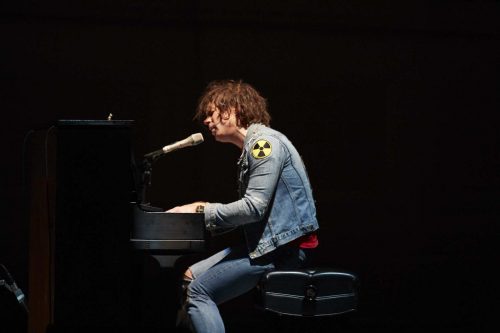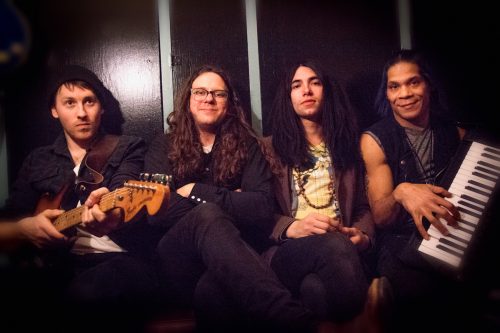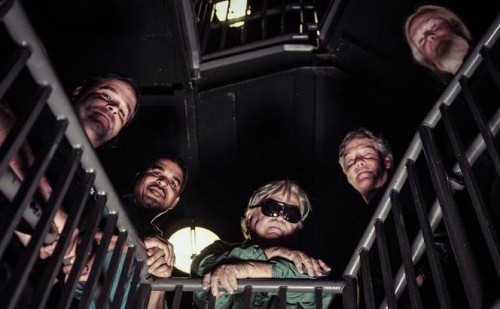“I don’t have like, much of a social life,” Ryan Adams says in a recent interview from his home in Los Angeles. “I read books on film noir. I want to see every movie ever made. Ninja movies. I have a library in my home. Not a lot of people can say that. But in the center of my home is like a library, and it’s full, and I spend a lot of time consuming information. And then I have my piano in the living room, and my cats and I collect art. I’m a sleeper hunter. I collect missing masterpieces — there’s a documentary recently about a Leonardo painting called ‘The Lost Leonardo’ that kind of explains what sleeper hunters are.”
For Adams, who will end a run of fall dates at New York’s famed Carnegie Hall on Wednesday, Nov. 27, there seems to be little, or maybe no, dividing line between life and art, and consumption and creation, no demarcation between spending the night watching old episodes of “Hill Street Blues” with his cats Agnes, Gobiashi and Grizzly or writing a song.
Keeping up with his output is a fool’s errand — his release of three studio albums, one a double disc, in 2005, was just a hint of his prolificacy to come. He’s put out four albums this year, and a fifth, the shelved, oft-bootlegged “Blackhole,” comes next month. This is not to mention EPs, live albums, and versions of albums by Taylor Swift, Bruce Springsteen, Bob Dylan and Oasis.
The fertile period is part of a career reboot following a 2019 New York Times report on women’s allegations of improper conduct.
“If I have a record that’s meaningful and it’s an archive record on Pax-Am that’s sitting on the shelf, it’s not doing anyone any good,” says Adams, referring to his Los Angeles studio and record label of the same name. “But also the newer records that I’m releasing, I’m telling a story in a different kind of a way. Like one of the things that was really hard to do is when I released the ‘Wednesdays’ record, it was about how in love I was with someone who at that point had already kind of turned their back on me and joined the mob and like, I don’t look down on this person for it. I knew that there are people who I played with who said he was never like that, or like all the people in my crew, all the women in my crew who were like, you’ve got this guy wrong: He’s a nerd and he’s funny and he doesn’t…This whole tale of staying in hotels, like, I don’t stay in hotels, I stay in the bus. Like there’s a lot of that stuff that didn’t make sense and didn’t really add up, and despite all that, I had this beautiful record that I had written called ‘Wednesdays,’ and even though I in my real life, I had to think about a person in a different way.”
Adams says part of the reason he now feels locked in is because his new manager, Richard Jones, understands how he wants to present his work, such as deciding to release “Blackhole.” (Also to come is a tour next year to mark the 25th anniversary of his first solo album, “Heartbreaker,” and one would assume more new music.)
“First, it was like getting back to doing things exactly like I wanted and not doing things based on the idea of trying to create big moments,” Adams says. “And I think with me, he sort of believed in that. Like the energy follows the story, the music and the energy will kind of follow each other and lead me where I’m supposed to go. And I think he believed in that part of me. And I think he always knew that.
“In my previous management situation, I would have to wait my turn because the roster was full, and it had like the Foo Fighters and Beck. And there was like, you know, Queens of the Stone Age at some point, there was always somebody who it was their turn to sort of be out there, and I would kind of have to wait. I just think that sometimes you outgrow people you work with. And I think that the guy that I worked with before just thought I should only be behind an acoustic guitar and maybe didn’t understand that for me, the expressions are of electric guitar, acoustic guitar, or the idea of different versions happening eventually, that it’s the content in the song and the heart of the song that will eventually be revealed in its own way, and the record itself is like a color, a motif.”
Adams references “The Joker,” the recent film made by his friend Todd Phillips, when considering his life after the Times article was published.
“If you really look at the story of the Joker that Todd is telling, he’s telling you the world is hungry for monsters. And by being so hungry for monsters, as opposed to just letting people be who they are, you will by rote create them even if they are not real. And so for me, I just kind of like look at the guitar now. And I think this is because of all the therapy I do every week. I do therapy every week, I do grief therapy. I help other people who are sober. Like if there’s a fan that’s having a problem and they reach out to me and they somehow get through, I’ll call them if I can. If I think I can do some good, I try to do things I can do. But the thing is, is by that process, I look at the guitar, and couldn’t look at it without feeling sick for a little while. It just it made me sick, made me miss my brother, or think about these people or their agendas or their conflated stories.”
Adams’ older brother, Chris, died in 2017.
To many, Adams is known more for his verbal dust-ups with musicians, audience members and journalists than his music. Some of the hits he’s taken might have been self-inflicted, but others have occurred beyond his control, chief among them his Ménière’s disease, a chronic inner ear disorder.
“I always, like, freak out on stage,” Adams explains. “In my younger years, in my 20s, I would have these weird times where I would become inconsolable or have these big emotional changes and I thought it was bipolarity or something. And then I got tested for epilepsy, and it turns out that I had an epileptic trigger for Ménière’s disease. So every time I played a place and they flashed me in the front with an LED or the lights were flashing, I would forget where I was and forget the lyrics. I would go blank.
“And I’m so glad I figured that out. We make the stage look like a living room now. My manager says people go like, oh, it’s so smart to play these really big places and make the stage look small. And because I always want a coat rack next to the piano because I like to hang my coat up — I’m from the South, you hang your coat up on a proper coat rack. So people go, it’s so cool, he makes the stage look like a living room, but what the funny thing is is our stage set costs like $90, and it’s literally preventing me from having an epileptic seizure.”
Carnegie Hall holds an esteemed place in New York and music history, but it is a deeply important personal space for Adams. In the early 2000s, his then-girlfriend, actress Parker Posey, took him there to see the singer Chavela Vargas, one of his idols. “It was the most exquisite performance ever. And I remember thinking, I want to play here one day. But I was like, I could never imagine doing it.”
He went on to play there several times, releasing live records from the venue in 2015 and 2023. The last time he saw Chris was at one his Carnegie Hall concerts.
As a voracious consumer of art, Adams wants to experience all of a painter, musician or writer’s expressions. He veers in conversation from James Joyce to Tom Wolfe to comparing a short story to a punk record.
“My influences kind of taught me that there really isn’t a right way to do it,” says Adams, who recently turned 50. “‘Finnegans Wake,’ some people say it’s impossible to read, and I go, I’ve read it twice. It’s one of my favorite books. Amy Hempel writes a two-page short story and I’m like, that reminds me of the Minutemen. I sort of believe in that continuity. Also, you know, The Smiths made everything that they ever made in five years. That blows my mind to even say that out loud. It gives me chills. But I didn’t want ‘Meat is Murder’ to sound like ‘The Queen is Dead.’ For me, the idea to champion rock ‘n’ roll means taking chances, and how do we take chances in music? We take chances with format. Sometimes the song just asks to be bashed out. Other times, I don’t know, I guess that’s why I kind of record live records at Carnegie Hall, because all of a sudden I’m like, wow, check out what this song sounds like when it’s down to the bones, right?
“And it’ll be of no surprise to anybody, but what I’ve discovered is, is that in all my songs, the deepest trench is me and the guitar. Or me and the piano. Like, there’s a thread there. And I think more so now, because every time I sit in front of the audience, I feel like I’m singing to them individually, but I’m singing to them as one of them. And I’m also kind of I’m singing to my brother, I’m singing to Chris. Like I feel him, like he’s, you know, I’m sure that someone could pick this apart, but by trying to sort of be brave by saying this part of it: But Chris is kind of sometimes, I feel like he’s piggybacking, and he’s like, not just watching over me, but like, I feel him at the show because he loved my music.
“When my brother passed and they took some of the things out of his office — I never knew this, my brother played it cool — but my brother had had these two huge frames, these two huge like matted boards. Every article or everything that had ever been printed about me that he could see in any magazine he had cut and pasted together and made these. And like, he was really proud of it. Instead of like our grandmother who used to cut out all of our baseball scores that got printed in our local paper, it was my brother’s version of that.
“I kind of was like, all right, Chris, you know, I’m going to stay in the game, and I’m going to go deeper. I’m going to go deeper and see how much further I can take people. It’s been a beautiful experience, honestly.”




Leave a Reply